

Why the Soviets Never Beat the U.S. to the Moon - INTERVIEW WITH CHARLES P. VICK. 21st Century - July 1997 A Soviet space expert discusses how recently declassified material confirms his painstaking discoveries over decades about why the Soviet Union was unable to win the space race.
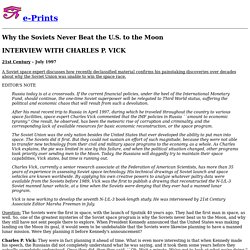
Russia today is at a crossroads. If the current financial policies, under the heel of the International Monetary Fund, should continue, the one-time Soviet superpower will be relegated to Third World status, suffering the political and economic chaos that will result from such a devolution. After his most recent trip to Russia in April 1997, during which he traveled throughout the country to various space facilities, space expert Charles Vick commented that the IMF policies in Russia ``amount to economic tyranny.''
Apollo 11 - Facts & Summary - HISTORY.com. At 9:32 a.m.
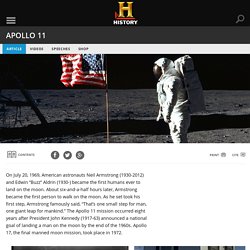
Poll Position. A July 2011 CNN/ORC poll conducted at the end of the Space Shuttle program showed a majority of respondents wanted the private sector to “run the country's manned space missions in the future.”
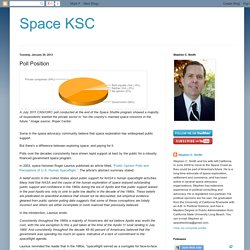
Image source: Roper Center. Some in the space advocacy community believe that space exploration has widespread public support. But there's a difference between exploring space, and paying for it. Polls over the decades consistently have shown tepid support at best by the public for a robustly financed government space program. In 2003, space historian Roger Launius published an article titled, “Public Opinion Polls and Perceptions of U.S. "Public Opinion Polls and Perceptions of US Human Spaceflight" Space Policy 19 (2003) 163–175 Public opinion polls and perceptions of US human spaceflight Roger D.

Launius* Division of Space History, National Air and Space Museum, Smithsonian Institution, P.O. Box 37012, NASM Room 3550, MRC 311, Washington,DC 20013-7102, USA Abstract A belief exists in the United States about public support for NASA’s human spaceflight activities. How the moon lost its magic even before Apollo 11 - space - 07 July 2014. Book information No Requiem for the Space Age: The Apollo moon landings and American culture by Matthew D.
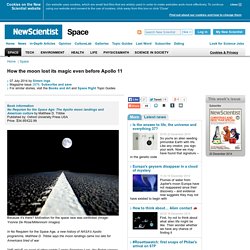
Tribbe Published by: Oxford University Press USA Price: $34.95/£22.99 Because it's there? Motivation for the space race was conflicted (Image: Yvonne De Rosa/Millennium Images) In No Requiem for the Space Age, a new history of NASA's Apollo programme, Matthew D. Tribbe says the moon landings came too late for Americans tired of war "WE HAVE no need of other worlds," wrote Stanislaw Lem, the Polish science fiction writer and satirist in 1961. A few years later, as NASA's advocates hunted for suitable justification for the US's $24 billion effort to put a man on the moon, they began to invoke humanity's "outward urge" – an inborn desire to leave our familiar surroundings and explore strange new worlds. A hastily concocted migration instinct might explain tourism. No Requiem for the Space Age: The Apollo Moon Landings and American Culture - Matthew D. Tribbe. Bulletin of the Atomic Scientists.
President Kennedy's Historic Speech on the Nation's Space Effort. Project Apollo: A Retrospective Analysis. Introduction On 25 May 1961 President John F.
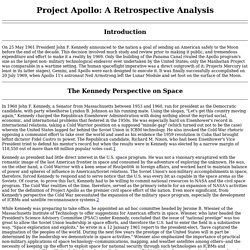
Kennedy announced to the nation a goal of sending an American safely to the Moon before the end of the decade. This decision involved much study and review prior to making it public, and tremendous expenditure and effort to make it a reality by 1969. Only the building of the Panama Canal rivaled the Apollo program's size as the largest non- military technological endeavor ever undertaken by the United States; only the Manhattan Project was comparable in a wartime setting. The human spaceflight imperative was a direct outgrowth of it; Projects Mercury (at least in its latter stages), Gemini, and Apollo were each designed to execute it.
Moondoggle: The Forgotten Opposition to the Apollo Program. For most of our lunar adventure, a majority of Americans did not support going to the moon.
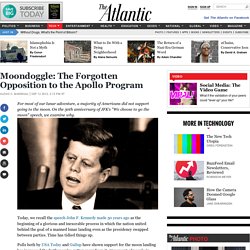
On the 50th anniversary of JFK's "We choose to go the moon" speech, we examine why. Today, we recall the speech John F. Kennedy made 50 years ago as the beginning of a glorious and inexorable process in which the nation united behind the goal of a manned lunar landing even as the presidency swapped between parties.
Time has tidied things up. Marketing the Moon. Is Space Exploration Worth the Cost? A Freakonomics Quorum. Warning: what follows is a long blog post, perhaps better suited for a newspaper or magazine, and it will at times require your close attention.
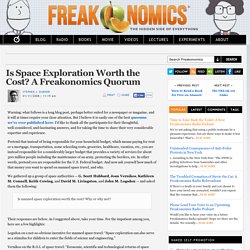
But I believe it is easily one of the best quorums we’ve ever published here. I’d like to thank all the participants for their thoughtful, well-considered, and fascinating answers, and for taking the time to share their very considerable expertise and experience. Pretend that instead of being responsible for your household budget, which means paying for rent or a mortgage, transportation, some schooling costs, groceries, healthcare, vacation, etc., you are instead responsible for a considerably larger budget that provides a variety of services for about 300 million people including the maintenance of an army, protecting the borders, etc.
In other words, pretend you are responsible for the U.S. Federal budget. We gathered up a group of space authorities — G. History.nasa.gov/sp4801-chapter4.pdf. Did Apollo Help Win the Cold War? Yesterday I posted this, in relation to readers offering conservative justifications for the Apollo program: A common argument is that by demonstrating our aerospatial-technological superiority to the Soviets, Apollo helped win the Cold War.
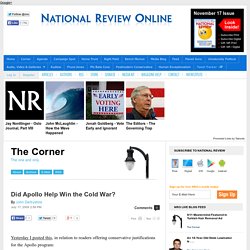
I can’t myself see any evidence that Apollo advanced our victory in the Cold War by so much as fifteen minutes, and nobody has anything concrete to offer. The Moon Landing through Soviet Eyes: A Q&A with Sergei Khrushchev, son of former premier Nikita Khrushchev. 1960 Democratic National Convention, 15 July 1960. Governor Stevenson, Senator Johnson, Mr.
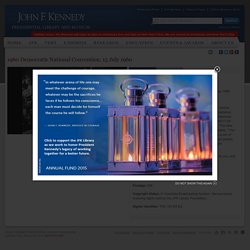
Butler, Senator Symington, Senator Humphrey, Speaker Rayburn, Fellow Democrats, I want to express my thanks to Governor Stevenson for his generous and heart-warming introduction. It was my great honor to place his name in nomination at the 1956 Democratic Convention, and I am delighted to have his support and his counsel and his advice in the coming months ahead. With a deep sense of duty and high resolve, I accept your nomination. I accept it with a full and grateful heart--without reservation-- and with only one obligation--the obligation to devote every effort of body, mind and spirit to lead our Party back to victory and our Nation back to greatness. I am grateful, too, that you have provided me with such an eloquent statement of our Party's platform. I feel a lot safer now that they are on my side again. Excerpt from an Address Before a Joint Session of Congress, 25 May 1961.
(Excerpt) Finally, if we are to win the battle that is now going on around the world between freedom and tyranny, the dramatic achievements in space which occurred in recent weeks should have made clear to us all, as did the Sputnik in 1957, the impact of this adventure on the minds of men everywhere, who are attempting to make a determination of which road they should take. Since early in my term, our efforts in space have been under review. With the advice of the Vice President, who is Chairman of the National Space Council, we have examined where we are strong and where we are not, where we may succeed and where we may not. Now it is time to take longer strides--time for a great new American enterprise--time for this nation to take a clearly leading role in space achievement, which in many ways may hold the key to our future on earth. I believe we possess all the resources and talents necessary. It is a most important decision that we make as a nation.
1962-09-12 Rice University. President Pitzer, Mr. Vice President, Governor, Congressman Thomas, Senator Wiley, and Congressman Miller, Mr. Webb, Mr. Bell, scientists, distinguished guests, and ladies and gentlemen: I appreciate your president having made me an honorary visiting professor, and I will assure you that my first lecture will be very brief. I am delighted to be here and I'm particularly delighted to be here on this occasion.